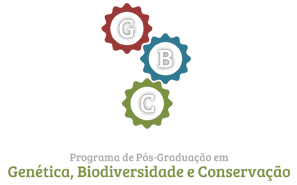PRESENTATION
The Graduate Program in Genetics, Biodiversity and Conservation or PPGGBC has started in 2010 after approval by CAPES (MSc degree) with the mission of reducing regional asymmetries in the training of qualified human resources in order to improve scientific knowledge and to evaluate the human impacts over biodiversity, particularly in northeastern Brazil. In 2014, the PPGGBC was reallocated to the “Biodiversity” committee at CAPES.
Ever since, the staff from PPGGBC has been dedicated to qualify professionals from Biological Sciences and related areas, by preparing them as independent, competent, creative and innovative scientists/professors/teachers. Therefore, the program follows the recommendation of expanding stricto sensu graduate courses in areas far from large urban centers in the Brazilian territory.
Because of the wide scope of biodiversity studies, the PPGGBC is structured into distinct research areas, ranging from taxonomy, zoology, ecology and natural history to those involving genetic analysis and environmental chemistry, assuring an integrated formation, encompassing several disciplines. Likewise, the MSc program offers a large number of topic-specific and multidisciplinary courses to meet the demands and the challenges for the conservation of the megadiverse and poorly known Brazilian biodiversity.
GOALS
Our mission is to qualify human resources in the distinct scopes of Biodiversity by improving the skills of professional from Biological Sciences and related areas, with emphasis in semiarid and transition zones in northeastern Brazil. Therefore, the general goal of PPGGBC meets the growing need for high-level, competent, creative and innovative teachers and researchers in the countryside and remote places along northeastern Brazil capable of acting in the three structuring focuses of Biodiversity:
1) Characterization of biodiversity (taxonomy, morphology, biology and genetic/ biochemical profile of organisms);
2) Organization and evolution of biodiversity (systematics, community ecology, landscape ecology, interaction network, biogeography, phylogeography, phylogenetics, genetic structure, and ecological interactions);
3) Utilization and importance of biodiversity (conservation biology, environmental sciences, ecotoxicology, bioprospection and improvement of local genetic resources)
For that, the specific goals of PPGGBC are lined up with two research fields (Biodiversity and Conservation and Genetics).
Graduates from PPGGBC are expected to be able to recognize and formulate significant questions for research in genetics, biodiversity and conservation and develop critical thinking and technical skills to answer such questions. In particular, graduates are prepared to meet the demands and particularities of historically neglected environments such as caatinga and transition areas in northeastern Brazil using diversified tools to analyze the distinct hierarchical levels of biodiversity, based on the diversity of disciplines, differentiated expertise of advisors and exchange of experiences among faculty members, students and society. Graduates should also be qualified for teaching in high school and higher education contributing to the training of human resources, researches and extension projects in order to minimize knowledge gaps and threats to biodiversity conservation in an integrative manner fostered by the diversified approaches experienced during the master’s course. Thus, the PPGGBC aims the improvement of human knowledge, with direct or indirect applications to national development and to better living conditions of the society, particularly within the areas of activity associated to UESB.
Corroborating the skills of the graduates by PPGGBC, about 60% of our masters carried on their academic education by being approved in PhD courses from top-ranked institutions. In other cases, the masters from PPGGBC were employed as high-school teachers or higher-education professors from public and private institutions, or compose the technical staff of environmental agencies and private companies.





